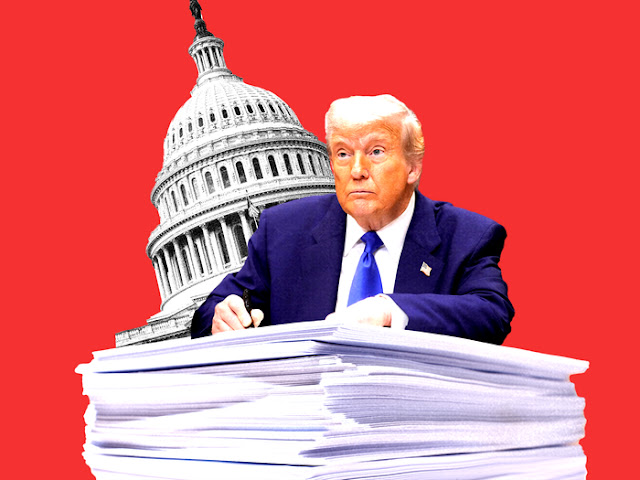Senate Republicans are scrambling to rescue President Trump’s centerpiece economic legislation — dubbed the “big, beautiful bill” — after a surprise ruling from the Senate parliamentarian Thursday derailed a major cost-cutting provision tied to Medicaid.
The setback came when Senate Parliamentarian Elizabeth MacDonough determined that a proposed cap on state health care provider taxes — a provision expected to cut hundreds of billions in Medicaid spending — violated the Byrd Rule, which governs what measures qualify for budget reconciliation. The decision means the provision cannot be passed with a simple majority vote, dealing a significant blow to GOP efforts to advance the bill before the July 4 deadline set by Trump.
“We have contingency plans, plan B, plan C,” said Senate Majority Leader John Thune (R-S.D.), acknowledging the challenge as he entered a closed-door lunch with Republican lawmakers. “We’re not giving up.”
Without the Medicaid savings, Senate Republicans must now find new ways to offset the cost of making several corporate tax cuts permanent — a central goal of the bill. Senate Democrats estimate that roughly $250 billion in planned Medicaid cuts were struck by the parliamentarian’s ruling.
Sen. Josh Hawley (R-Mo.) expressed uncertainty, saying, “We have no idea what’s going to happen here, we got to work on some kind of a fix,” and urged negotiators to ensure rural hospitals are protected. Several GOP senators — including Susan Collins (R-Maine), Lisa Murkowski (R-Alaska), Jerry Moran (R-Kan.), and Thom Tillis (R-N.C.) — also raised alarms that the provision could push struggling rural hospitals into bankruptcy.
The ruling adds new urgency and tension to the already tight legislative timeline. Senate Finance Committee Chairman Mike Crapo (R-Idaho) downplayed the chaos but acknowledged the serious implications. “This is regular process. Now we know what the guidance was, we will react to it,” he said.
Asked how long the delay could last, Crapo joked: “Sometime between now and next March.” But few in the Capitol were laughing.
Sen. John Kennedy (R-La.) said the decision would stall any vote in the immediate term. “I don’t anticipate now us voting on the motion to proceed tomorrow,” he said. “This substantially reduces savings. I think my colleagues… are probably going to be screaming like they’re part of a prison riot.”
Kennedy also warned that many lawmakers may be unwilling to stick around Washington over the July 4 recess without a clear legislative path. “One of John [Thune]’s challenges is going to be… keeping people here,” he said.
Trump, for his part, publicly urged Republicans to stay in town. “To my friends in the Senate, lock yourself in a room if you must, don’t go home, and GET THE DEAL DONE THIS WEEK,” he wrote on social media Tuesday.
Sen. Ron Johnson (R-Wis.), a member of the Finance Committee, called the ruling “a big ol’ grenade” that could blow up the entire reconciliation package. He urged leaders to abandon cuts to Medicaid and instead target other mandatory spending increases, which he said have added more than $400 billion annually to the federal budget.
Sen. Rick Scott (R-Fla.) echoed that frustration, labeling the provider tax arrangement a “scam” that lets states boost their federal Medicaid reimbursement without contributing more themselves. “I’m focused on getting a deal done,” he said, adding that the language could be rewritten to comply with reconciliation rules.
Senate Budget Committee Chair Lindsey Graham (R-S.C.) is also involved in efforts to rework the bill. “The provider tax is one of the biggest scams I’ve ever seen in Washington,” he said. “I’m hopeful we can find a way forward that is Byrd compliant.”
Meanwhile, Hawley suggested that GOP negotiators revisit the less stringent Medicaid reform package passed by the House last month, which he said is “better” and more protective of rural hospitals.
In private discussions, Hawley said Trump himself indicated support for the House language and emphasized that he does not want the legislation to become primarily about cutting Medicaid. “This is a tax-cut bill, it’s not a Medicaid-cut bill,” Hawley said. “He made that very clear to me.”












